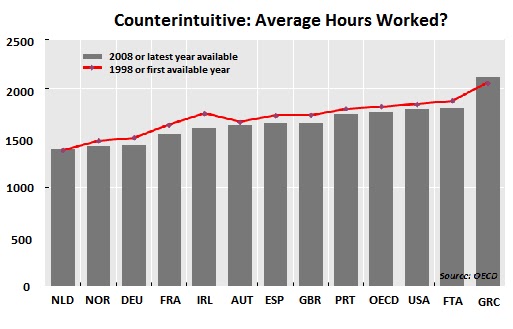The conventional narrative about the European debt crisis largely accepts the contention that the periphery of Europe have different work habits and these account to a large extent the economic and financial problems. Yet often times the discussion takes on such ethnocentric dimensions that sometimes it is difficult to see what is real.
This chart: to the right illustrates what many will find to be counter-intuitive. The most recent data from the OECD covers 2008 and shows that in that year, Greek workers on average worked 48% more than their industrious German neighbors. The OECD data shows the average Greek worker spent 2120 hours at work compared with 1429 hours in Germany. Moreover, Greece is one of the only OECD countries in which workers were working longer in 2008 than in 1998. With 1802 hours at work, the average Italian employee spent more than 25% more time at work than the average German worker.
While many will be initially surprised by the data, on reflection it makes intuitive sense. In crude terms, wealthier countries typically work smarter--more capital intensively--than poor countries, not longer. Contrary to conventional wisdom, the lack of Greek competitiveness, for example, does not seem to lie in hours working but with the combination of productivity and wages/benefits (unit labor costs).
A more rigorous analysis would also include an analysis of the structure of the economy. In Greece, for example, the agriculture sector accounts for 4% of the value of added of the entire economy, which is among the highest in the OECD. In contrast, in most euro zone countries, the agricultural sector accounts for 2-3% of the value-added, and in Germany only 1%. In contrast, the 73% of the value-added in the Greek economy is derived from services, which is at the upper end of the euro zone community. The German service sector accounts for 69% of the value-added in the economy.
- English (UK)
- English (India)
- English (Canada)
- English (Australia)
- English (South Africa)
- English (Philippines)
- English (Nigeria)
- Deutsch
- Español (España)
- Español (México)
- Français
- Italiano
- Nederlands
- Português (Portugal)
- Polski
- Português (Brasil)
- Русский
- Türkçe
- العربية
- Ελληνικά
- Svenska
- Suomi
- עברית
- 日本語
- 한국어
- 简体中文
- 繁體中文
- Bahasa Indonesia
- Bahasa Melayu
- ไทย
- Tiếng Việt
- हिंदी
Surprising Comparison of Eurozone Average Hours Worked
Published 01/11/2012, 02:41 AM
Updated 07/09/2023, 06:31 AM
Surprising Comparison of Eurozone Average Hours Worked
Latest comments
Loading next article…
Install Our App
Risk Disclosure: Trading in financial instruments and/or cryptocurrencies involves high risks including the risk of losing some, or all, of your investment amount, and may not be suitable for all investors. Prices of cryptocurrencies are extremely volatile and may be affected by external factors such as financial, regulatory or political events. Trading on margin increases the financial risks.
Before deciding to trade in financial instrument or cryptocurrencies you should be fully informed of the risks and costs associated with trading the financial markets, carefully consider your investment objectives, level of experience, and risk appetite, and seek professional advice where needed.
Fusion Media would like to remind you that the data contained in this website is not necessarily real-time nor accurate. The data and prices on the website are not necessarily provided by any market or exchange, but may be provided by market makers, and so prices may not be accurate and may differ from the actual price at any given market, meaning prices are indicative and not appropriate for trading purposes. Fusion Media and any provider of the data contained in this website will not accept liability for any loss or damage as a result of your trading, or your reliance on the information contained within this website.
It is prohibited to use, store, reproduce, display, modify, transmit or distribute the data contained in this website without the explicit prior written permission of Fusion Media and/or the data provider. All intellectual property rights are reserved by the providers and/or the exchange providing the data contained in this website.
Fusion Media may be compensated by the advertisers that appear on the website, based on your interaction with the advertisements or advertisers.
Before deciding to trade in financial instrument or cryptocurrencies you should be fully informed of the risks and costs associated with trading the financial markets, carefully consider your investment objectives, level of experience, and risk appetite, and seek professional advice where needed.
Fusion Media would like to remind you that the data contained in this website is not necessarily real-time nor accurate. The data and prices on the website are not necessarily provided by any market or exchange, but may be provided by market makers, and so prices may not be accurate and may differ from the actual price at any given market, meaning prices are indicative and not appropriate for trading purposes. Fusion Media and any provider of the data contained in this website will not accept liability for any loss or damage as a result of your trading, or your reliance on the information contained within this website.
It is prohibited to use, store, reproduce, display, modify, transmit or distribute the data contained in this website without the explicit prior written permission of Fusion Media and/or the data provider. All intellectual property rights are reserved by the providers and/or the exchange providing the data contained in this website.
Fusion Media may be compensated by the advertisers that appear on the website, based on your interaction with the advertisements or advertisers.
© 2007-2024 - Fusion Media Limited. All Rights Reserved.
